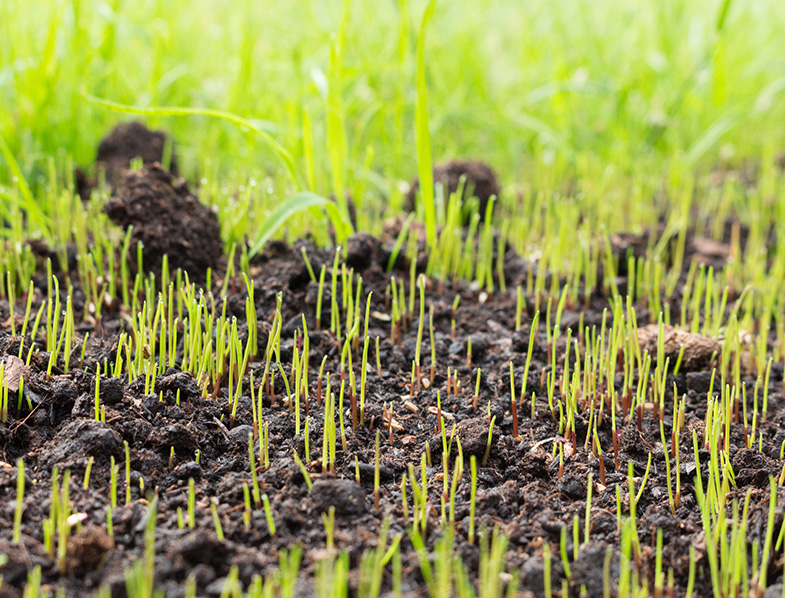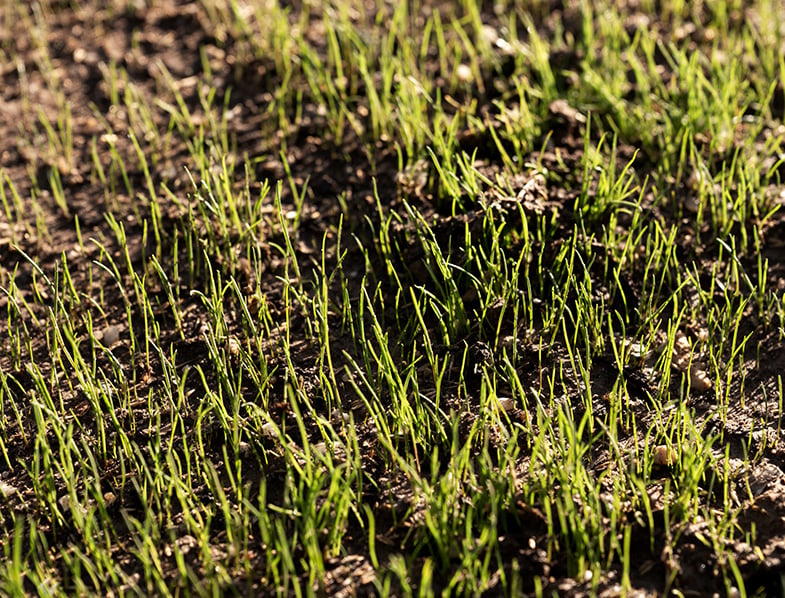Planting grass seed can be an affordable and effective way to create a lush and green lawn. However, one thing that many homeowners wonder is how long it takes for grass seed to grow. The answer is not a simple one, as several factors can affect germination time and overall seed growth. In this article, we’ll explore the various factors that impact grass seed growth, as well as some tips on how to speed up growth and common problems to avoid.
Quick Verdict: Grass seed germination time depends on factors such as soil temperature and moisture, seed variety and quality, planting depth, seed coverage, sunlight, and climate conditions. Germination usually occurs within 5-30 days, with establishment taking 2-6 weeks, and maturation in 60-90 days. Speed up grass seed growth by choosing the right seed, preparing the soil, using proper watering techniques, fertilizing, and overseeding. Address common problems like inadequate soil preparation, improper watering, pests, diseases, and weed competition for the best results.
Quick Facts
| Factor | Detail |
|---|---|
| Germination Time | 5-30 days |
| Establishment Time | 2-6 weeks |
| Maturation Time | 60-90 days |
| Soil Temperature | 60-75 degrees Fahrenheit for germination |
| Planting Depth | 1/4 to 1/2 inch |
| Factors Affecting | Soil temperature and moisture, seed variety and quality, planting depth, seed coverage, sunlight, climate conditions |
| Tips to Speed Up | Choose the right seed, prepare the soil, water properly, fertilize, overseed |
| Common Problems | Inadequate soil preparation, overwatering or underwatering, pests, diseases, weed competition |
Factors affecting grass seed germination time
Soil temperature and moisture
The overall temperature and moisture level of the soil can significantly affect how long it takes for grass seed to germinate. Seeds generally germinate best when the soil temperature is between 60-75 degrees Fahrenheit. If the soil temperature is too cold or too hot, germination may be delayed or altogether prevented. Additionally, if the soil is too wet or too dry, the seeds may not have enough moisture to grow.
It’s important to note that different types of grass seed have different preferences when it comes to soil temperature and moisture. For example, cool-season grasses like Kentucky bluegrass and fescue prefer cooler soil temperatures, while warm-season grasses like Bermuda grass and zoysia prefer warmer soil temperatures.
Seed variety and quality
Not all grass seed is created equal. The variety and quality of the seed you use can impact how long it takes for it to grow. Certain varieties of grass seed have longer germination times than others. For example, some types of fescue can take up to 21 days to germinate, while perennial ryegrass can germinate in as little as 5 days.
Additionally, using high-quality seed can increase the likelihood of successful germination and overall growth of your lawn. High-quality seed is typically free from weed seeds and other contaminants, and has a higher percentage of viable seeds.
Planting depth and seed coverage
The depth at which you plant your grass seed can affect germination time. Seeds that are planted too deep may not receive enough sunlight to germinate quickly. It’s generally recommended to plant grass seed at a depth of 1/4 to 1/2 inch.
Additionally, if the seeds are not spread out evenly and covered with enough soil, some may not have the opportunity to grow at all. It’s important to ensure that the seed is evenly distributed and covered with a thin layer of soil to ensure optimal germination.
Sunlight and climate conditions
Grass seed needs sunlight to germinate successfully. If you’re planting grass seed in an area that doesn’t receive much sunlight, it may take longer for the seeds to grow. Additionally, climate conditions such as humidity and wind can also impact how long it takes for grass seed to germinate.
It’s important to keep in mind that different types of grass have different sunlight requirements. For example, shade-tolerant grasses like fine fescue can grow in areas with less sunlight, while sun-loving grasses like Bermuda grass require full sun to thrive.
Climate conditions such as humidity and wind can also impact how long it takes for grass seed to germinate. High humidity can create an ideal environment for fungal diseases, which can damage or kill young grass seedlings. Wind can also dry out the soil and prevent the seed from germinating properly.
By taking into account these various factors, you can ensure that your grass seed has the best chance of germinating quickly and growing into a healthy, lush lawn.

Understanding the stages of grass seed growth
Germination
The first stage of grass seed growth is germination. This is when the seed begins to sprout and takes root in the soil. Germination time can vary depending on the factors we previously discussed. Generally, grass seed will begin to germinate within 5-30 days after planting.
Establishment
Once the seed has germinated, the next stage is establishment. This is when the grass plant begins to grow and develop a root system. During this stage, it’s crucial to keep the seedbed moist to ensure proper growth. This stage can last anywhere from 2-6 weeks, depending on the type of grass seed you’ve planted.
Maturation
The final stage of grass seed growth is maturation. This is when the grass plant reaches maturity and is ready to be mowed. The average time it takes for grass seed to reach this stage is 60-90 days after planting.
How to speed up grass seed growth
Choosing the right grass seed
Choosing a high-quality grass seed that’s appropriate for your climate and soil type can help speed up growth. Certain grass varieties are known for their quick germination times, so be sure to research before purchasing.
Preparing the soil
Proper soil preparation is essential for successful grass seed growth. Remove any debris from the soil and till the top layer to loosen it up. Additionally, adding nutrient-rich soil amendments can help ensure your grass has everything it needs to grow quickly and thrive.
Proper watering techniques
Watering your grass seedbed the appropriate amount is crucial for successful growth. Too much or too little water can hinder germination and overall growth. Be sure to water the seedbed regularly, keeping the soil moist but not saturated.
Fertilizing and overseeding
Adding fertilizer to your grass seedbed can help speed up growth and ensure your lawn is healthy and green. Additionally, overseeding can help fill in any patches and create a denser lawn, which can lead to faster overall growth.

Common grass seed growing problems and solutions
Inadequate soil preparation
If your grass seed isn’t growing as quickly as you’d like, inadequate soil preparation may be the culprit. Be sure to till and amend your soil appropriately to ensure success.
Overwatering or underwatering
Both overwatering and underwatering can negatively impact grass seed growth. Be sure to water your seedbed appropriately and monitor moisture levels regularly.
Pest and disease control
Grass seed can be vulnerable to pests and disease, which can prevent proper growth and overall lawn health. Consider using preventive measures such as pest control and fungicides to avoid potential problems.
Competition from weeds
If weeds are competing for sunlight and resources in your grass seedbed, it can slow down overall growth. Consider using a pre-emergent herbicide to avoid weed growth before it starts.
In conclusion, how long it takes for grass seed to grow can vary depending on several factors. To ensure speedy and successful growth, be sure to choose high-quality seed, prepare the soil appropriately, water the seedbed regularly, and take preventive measures against potential problems such as pests and weeds. With a little bit of patience and proper care, you’ll have a lush green lawn before you know it!
Grass FAQS
How often do you water new grass seed?
You should water new grass seed at least once or twice a day, keeping the top layer of soil consistently moist but not saturated. Monitor the soil moisture levels and adjust your watering frequency accordingly.
Can grass seed grow in 3 days?
While some grass seed varieties, such as perennial ryegrass, can germinate as quickly as 5 days, it’s uncommon for grass seed to grow in just 3 days. Most grass seeds take between 5-30 days to germinate, depending on factors like seed variety, soil temperature, and moisture.
How long does grass seed take to fully grow?
Grass seed typically takes 60-90 days to fully grow, reaching the maturation stage where it is ready to be mowed. This timeline can vary depending on factors like seed variety, soil conditions, and proper care.
How do I speed up grass seed germination?
To speed up grass seed germination, choose a high-quality seed variety suitable for your climate and soil type, properly prepare the soil, maintain appropriate soil temperature and moisture levels, and plant the seed at the recommended depth.
Can you overwater new grass seed?
Yes, overwatering new grass seed can hinder germination and overall growth. It’s essential to keep the soil moist but not saturated to avoid drowning the seeds and causing issues like fungal diseases.
Is it OK to water new grass seed at night?
It is generally better to water new grass seed in the early morning or early evening, allowing the water to be absorbed before nighttime. Watering at night can lead to prolonged moisture on the grass and soil, which can encourage fungal diseases and other issues.
